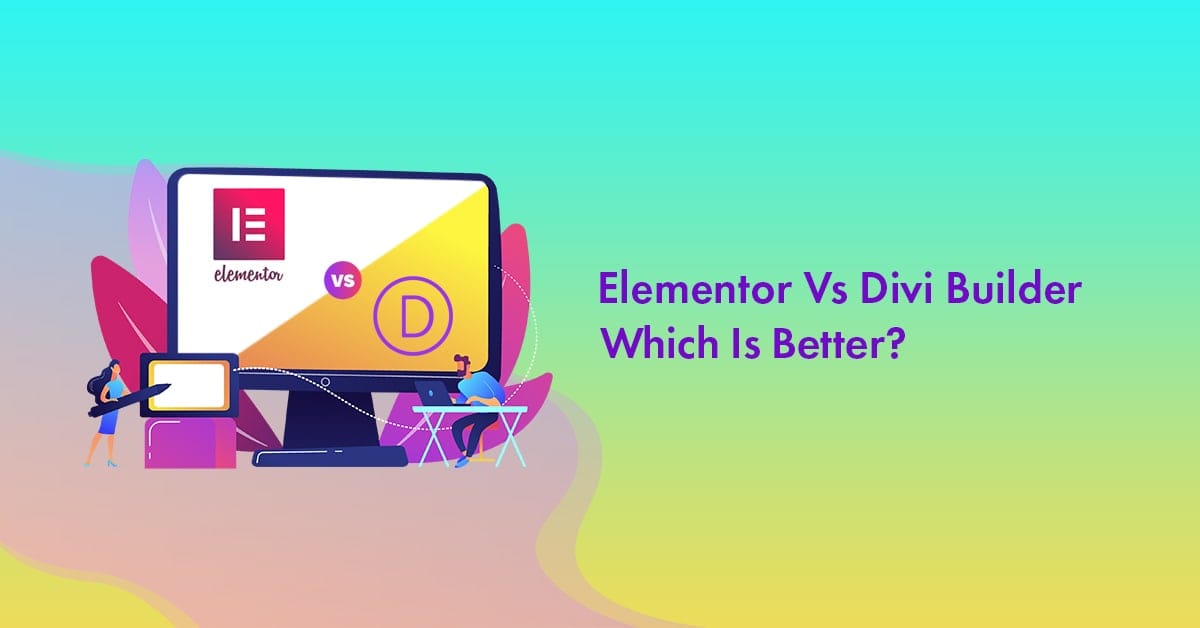
Are you looking for the best visual page builders for WordPress? Confused between Elementor and Divi builders?
Whether you want to customize your website or create a portfolio site, a page builder is what you need. A page builder plugin helps you create any website you want. From landing pages to custom sales pages, you can literally design everything using page builders.
When it comes to WordPress page builders, both Elementor and Divi builders are widely popular and they both offer exceptional features including drag and drop editors.
In this detailed guide, we will talk about Elementor vs Divi builder along with their features, pros, cons, pricing etc so you can pick the RIGHT one for your website needs.
Are you ready to find out? Let’s jump into the details.
Revealing the Main Differences (Elementor vs Divi Builder)
During our reviewing phase, we have encountered several differences between Elementor and Divi page builders. Few of them are crucial to know and would directly impact your decision.
Elementor beats Divi in pricing, number of modules, popup builder feature, third party marketplace size, and performance (small page size).
Whereas Divi Builder has more template (layout packs), A/B Testing, inbuilt theme and a dynamic interface.
In a nutshell, if you are looking for an exclusive page builder for WordPress site, go for Elementor Pro. We have found the Elementor free version a perfect fit for beginners who have never tried Page builders.
If you want both page builder and WordPress themes, Divi builder from Elegant themes is the right choice.
So are you ready to uncover the differences?
1. Difference in Drag and Drop Editor Interface
One of the major reasons to use page builders like Elementor and Divi builder is that they offer drag and drop editors. Both their interfaces are easy to work with.
So let’s have a quick glimpse of both their interfaces.
Here’s how the interface of the Elementor plugin looks like;
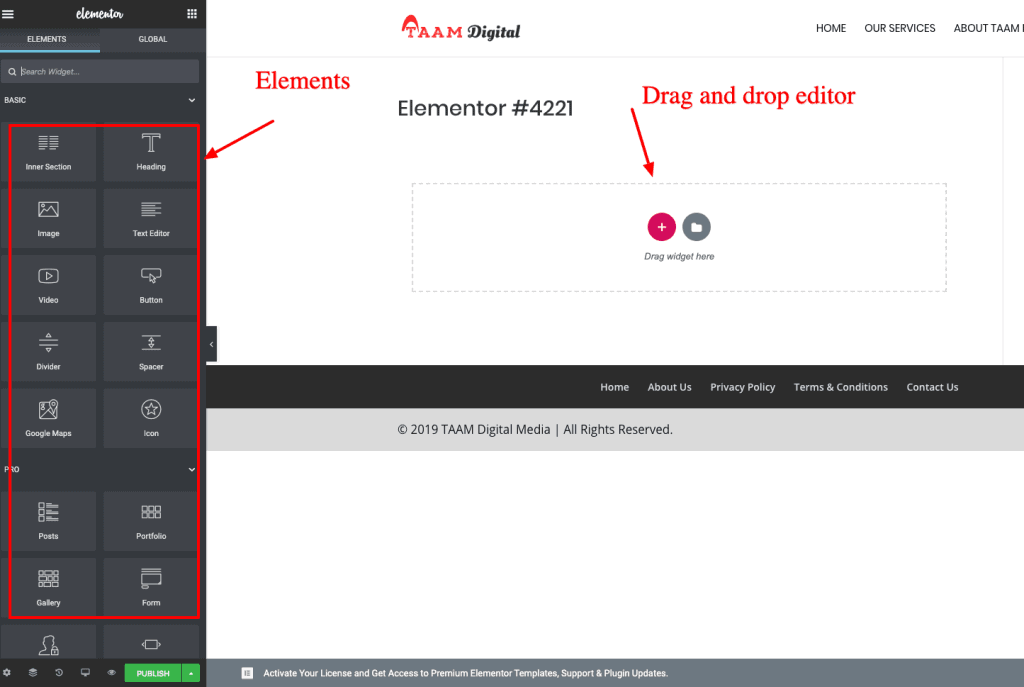
As you can see above, Elementor offers various elements that you can drag and drop to the “drag and drop editor” to start customizing your blog posts, pages or literally anything you want on your site.
As we already discussed above, you’ll have access to over 80 design elements to work with.
Here’s how the interface of the Divi builder looks like;
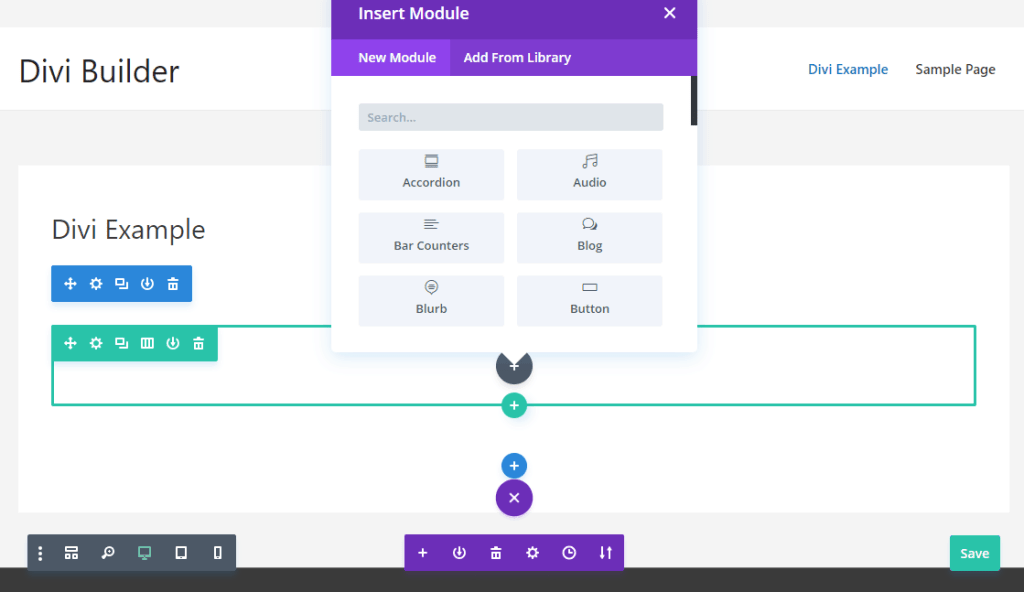
As you can see above, Divi builder works differently (when compared to Elementor) as you access everything with floating buttons that open various popups (as shown above).
That way you can insert any new module you want. Divi builder offers you 36 various modules to work with.
In a nutshell, the Elementor interface follows a more static approach whereas the Divi Builder’s approach requires you to click on their floating buttons to customize your website.
So it depends on your personal preference (when it comes to the interface choice) and we found both are extremely easier to work with.
Customizing Elements:
For customizing elements, Elementor has a menu (customizer) that always sticks to the left while Divi’s customizer offers a free hand approach – Meaning with Elementor, you will always have a menu on the left but Divi’s customizer gives you more scope on the screen.
In the first image below, you can see the “Elementor customizer” is stuck to the left. However in the second image, the “Divi customizer” seems more flexible & user friendly (it can be moved anywhere on the screen but can also snap to the left)


Adding Elements (Modules)
“In Divi, we call it Modules & In Elementor, we call it Elements”.
Apart from this, Elementor uses “Sections & Columns” to give a structure (adding elements) to the page. On the other hand, Divi uses “Sections & Rows”. Again, this is totally subjective.


Verdict: In a nutshell, we found that the process of adding elements (modules) in both page builders is flexible and easy to use. We like the Elementor approach more, but as we said this is completely subjective.
2. The “Free Version” Difference
The free version is undoubtedly one of the main reasons behind the Elementor Popularity as compared with Divi page builder.
Page builders are expensive. We all know that!. And the free version would be highly beneficial in a situation where people have no prior experience with page builders.
When you search “Page Builder” inside the WordPress plugin repository, the free version of Elementor always comes first – [5 Million+ Installations, 4.5 stars rated is the proof of its reliability]

Talking about the Divi page builder, Its free version is NOT EXISTED!
3. The Difference in Modules & Elements
Elements (Modules) or simply “building blocks” are what you should mainly look at in a page builder plugin. You cannot create a page without these blocks.
So, this is one of the primary factors which impact your decision.
- Elementor elements: Free version (40+ Widgets), Pro version (Upto 50 Extra Widgets)
- Divi modules: 36 Only.
Comparing the numbers, Elementor is clearly a winner.
However, you should always explore the list of available modules manually and then make a decision.
Elementor elements have been divided into 4 categories: Basic Widgets, Pro Widgets, Theme Elements, and WooCommerce Widgets.
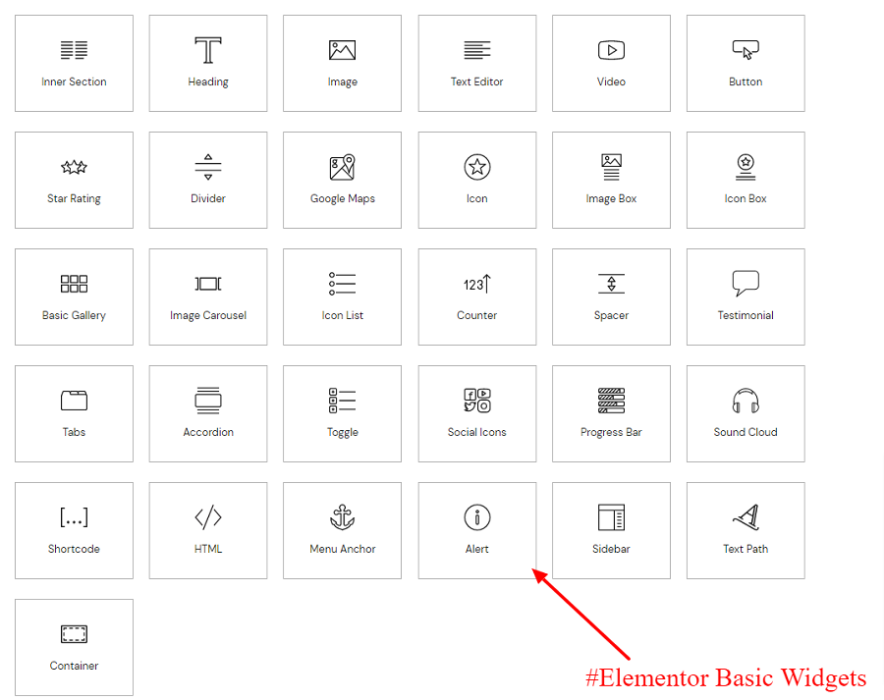


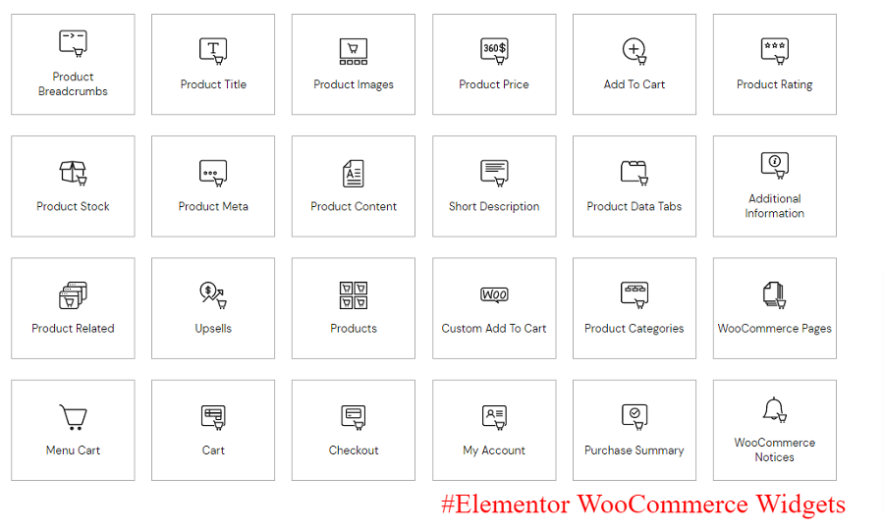
On the other hand, Divi modules have been divided into 3 categories: Content elements, eCommerce elements, and Structural elements.


Quick note: Similarly, The elements can be increased in the Divi with the help of third party plugins. However, Divi has less supported third party addons compared to Elementor.

4. The Difference in Premade Templates
To speed up the designing process, Elementor and Divi both offer tons of premade templates that you can use to create individual web pages or entire websites with a single click.
In Elementor, the templates has been divided into:
- Individual page templates (Popup page, landing page, single page, etc)
- Blocks templates (Can embed into any page. Example: 404 Block, Footer, etc)
- Complete Website Kit (Set of multiple pages with the same style & design)



Divi offers 294 Layout Packs (One layout pack can be made up with multiple pages templates including contact page, about page, etc).
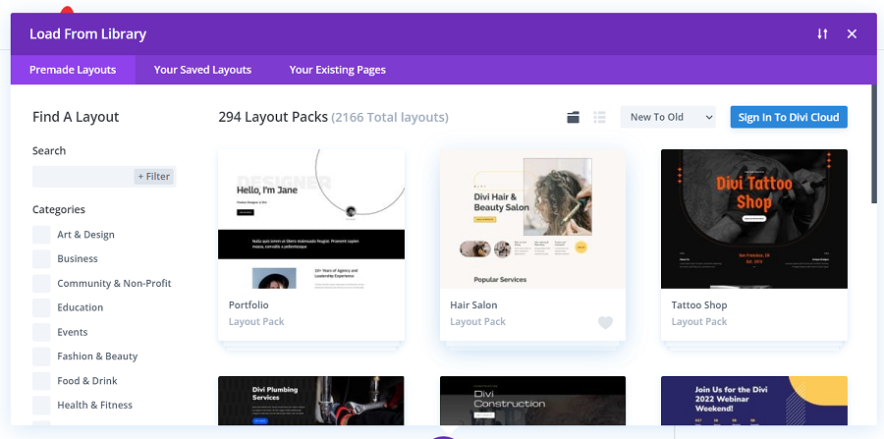
The Verdict is Elementor clearly wins when we talk about the number of landing pages templates, popup templates or block templates. However, Divi is slightly ahead in terms of premade layouts packs.
One of the main advantages of going with Elementor Pro is Popup Forms.
Elementor has a drag & drop inbuilt popup form builder which can be used to create different popups (modal, notification bar, slide-in, etc). Yes there is no need to install any external plugin for this.
You can use Elementor widgets to design a beautiful popup forms (Email Opt-in, Login/Registration, etc) and embed anywhere on a website.

In Divi you can enable popup forms functionality by using its external paid plugin called Bloom. But this plugin doesn’t offer a drag & drop approach and is also limited compared to Elementor POWERFUL popup builder.
So yes, Elementor gets one more extra mark than Divi.
6. The Difference in Form Widget
Did you know both Divi & Elementor have an inbuilt form widget (module)?
But there is a difference. You can customize form fields, change colors, etc. However, one thing the Elementor form widget lacks is “CONDITIONS”.
Divi’s form widget is more POWERFUL and allows you to apply conditional logic to the forms which is one of the essential features of any form builder.

This difference seems minor, but it’s not. Those who have experience with WordPress form builder plugins could understand the benefit of “Conditional Logic” easily.
In a nutshell, Divi’s form Widget is more robust than Elementor.
7. Inbuilt A/B Testing Benefit
A/B Testing – Divi’s most unique feature which allows you to split test the page elements against different versions. For example you can test which layout works best for reducing bounce rate.
This A/B testing act as a marketing strategy helps in improving conversion and sales.
In Elementor, the feature of A/B testing is not given by default; however, you can use free tools like Microsoft Clarity to analyze how users behave with your website layout, elements, etc. Third party plugins like Split test for elementor plugin could also do some help.
8. The Difference in Pricing
One of the major things most people consider while picking any WordPress page builder is pricing. So which one is more affordable among Divi and Elementor?
Let’s find out and discuss both of these page builders pricing plans.
Elementor Pricing
The good thing about using Elementor is that it has a free version which you can download from here. Unlike most other page builders, its free version is very usable and you can easily customize simple websites.
For serious users who want to customize their sites in any way, Elementor Pro is a better deal. In fact, you can use the free version for some time and as your site grows, you can invest in Elementor Pro as you can easily upgrade to the Pro version without losing any changes to your design.
So how much does Elementor Pro cost?
It offers you four pricing options which are listed below.
- Essential Plan costs $59 a year and can be used for 1 site
- Advanced Plan costs $99 a year and can be used for 3 sites
- Expert Plan costs $199 a year and can be used for 25 sites
- Agency Plan costs $399 a year and can be used for a 1000 sites
All plans included: 100+ Widgets, 300+ Templates, Theme Builder, Pop up Builder, WooCommerce Store Builder, Landing Page Builder, Premium Support, etc.
Elementor Pro offers you a 30-day money back guarantee. So you can ask for a refund within 30 days if you feel it’s not right for you.
Divi Pricing
Divi Builder doesn’t offer a free version available (unlike Elementor).
So how much does a Divi builder cost?
By now you know that Elegant themes offer Divi Builder and it’s not sold separately. So you’ll have to sign up for Elegant themes (don’t worry, it’s extremely affordable) to be able to use the Divi builder.
Elegant Themes offers two pricing plans which are;
- Yearly access (costs you $89 per year and gives you access to Divi builder, Extra, Bloom and Monarch)
- Lifetime access (costs you $249 which is a one-time fee and gives you access to Divi builder, Extra, Bloom and Monarch)
Click to buy Elegant Themes (with Divi builder)
They also offer a 30-day money back guarantee. That means if you don’t enjoy your Elegant Themes membership (or the Divi builder), you will get a refund within 30 days after signing up.
So what’s the verdict?
Both are affordable and available at $100 per year and that’s the reason why millions of people are using both these page builders. Elementor is the cheapest when compared to the Divi builder (as Elementor pricing starts at just $59 per year whereas the Divi builder along with the Elegant themes membership pricing starts at $89 per year).
9. Elementor has a Maintenance Mode (Divi Haven’t)
In a maintenance mode the website goes down several times and during this phase the visitors might see 404 code or even face website crash type issues.
This is bad for user experience as well as SEO
As per Google, your website should return HTTP 503 code during maintenance mode. This way your site SEO won’t be impacted.
In Elementor, the feature of Maintenance mode is inbuilt – Meaning you can use a maintenance mode template and configure your website settings so that it can return the right HTTP code.
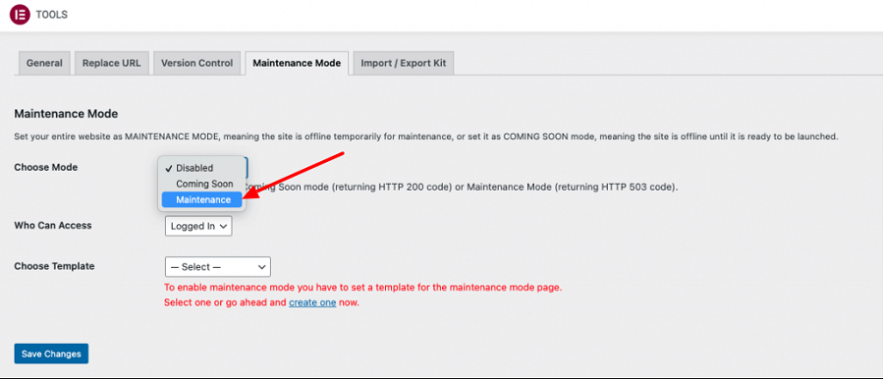
In Divi, you will find the Maintenance mode templates. However it doesn’t have settings which enable a maintenance mode on your site. In other words, you need the help of an external plugin like”Easy Updates Manager” to finish the job.
10. The Shortcode Widget
The Shortcode Widget (Module) – Elementor ✓, Divi X
We were surprised to know that the Divi builder doesn’t have a shortcode module. It is one of the essential widgets we personally use on a regular basis.
Without it, how could you embed the dynamic content on your post, pages, sidebar, etc.?

11. Divi’s Role Editor is Much Powerful than Elementor’s
The Role editor function is going to be highly useful when you’re building sites for your clients who don’t have a knowledge of WordPress, designing, etc. With the help of Role editor you can restrict their access so that they can’t interfere with settings that ruin a website design.
Both page builders offers various rules for the different roles:
- Divi: Administrator, Editor, Author, Contributor, Shop Manager
- Elementor: Editor, Author, Contributor, Subscriber
Compared to Elementor basic rules, Divi’s role editor gives you the ability to restrict much higher level actions.
For Example:
In Elementor only 2 rules is assigned to the Editor role:

Whereas In Divi, you can enable/disable high level to low level restriction for a “Editor” and other roles:





Elementor vs Divi: Performance Test
One of the primary reasons people avoid page builders is because of the load they make on a website speed.
Let’s see how fast Elementor & Divi Page builders are…
Elementor Performance Test:
We have tested a page made up with an Elementor template. For extra load, we have manually added extra widget such as carousel, contact form, table, etc.
Here’s how Elementor performed:
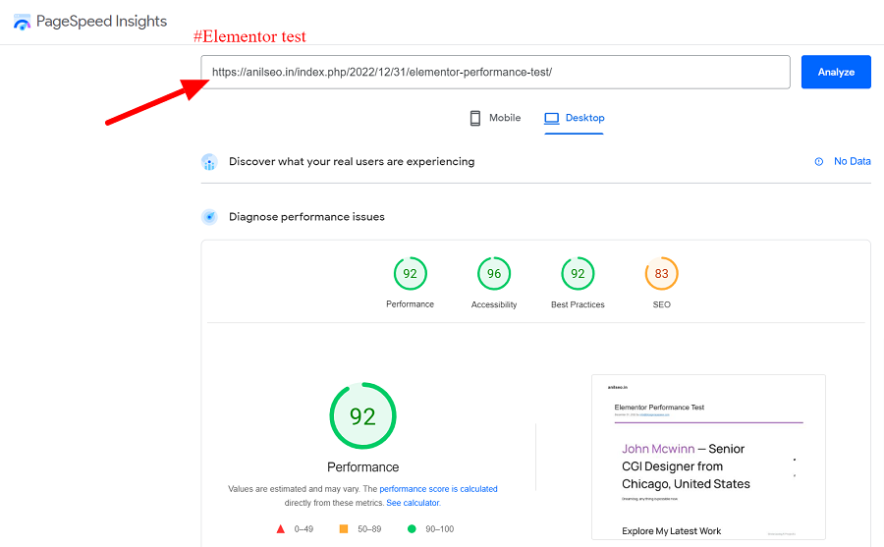
Divi Performance Test:
Here we have also used a divi premade template with extra custom modules.
Here’s how Divi performed:

You can see how amazingly both page builders performed. This is just a single test with a slight difference in modules. Both page builders are highly optimized and don’t impact the loading speed.
For shared hosting based sites, the user can also use a performance optimization plugin like WP Rocket to enhance the web page performance.
Divi vs Elementor: Features List
Divi Builder Features
Divi Builder from Elegant themes comes with a ton of excellent in-built features which are listed below.
- Drag and drop page builder (it’s the core feature of Divi builder)
- The ability to create multiple row and column layouts for your posts and pages
- Comes with a wide range of prebuilt page layouts which can save a ton of time
- Comes with a contact form module by default (so you don’t need any 3rd party plugin to create a contact page on your site)
- Comes with an in-build pricing table module (which is extremely helpful for those who are selling products from their site)
- Offers you a layouts library (which is equipped with 110+ premade websites & 880+ premade layouts)
- Offers you 100% responsiveness (which gives you full control over how your website looks on mobile devices)
- Access to over 40 various website elements (ranging from testimonials to sliders to email opt-in forms)
Here are some of the amazing benefits of using Divi Builder.
Divi Builder Offers Over 150 Layout Packs
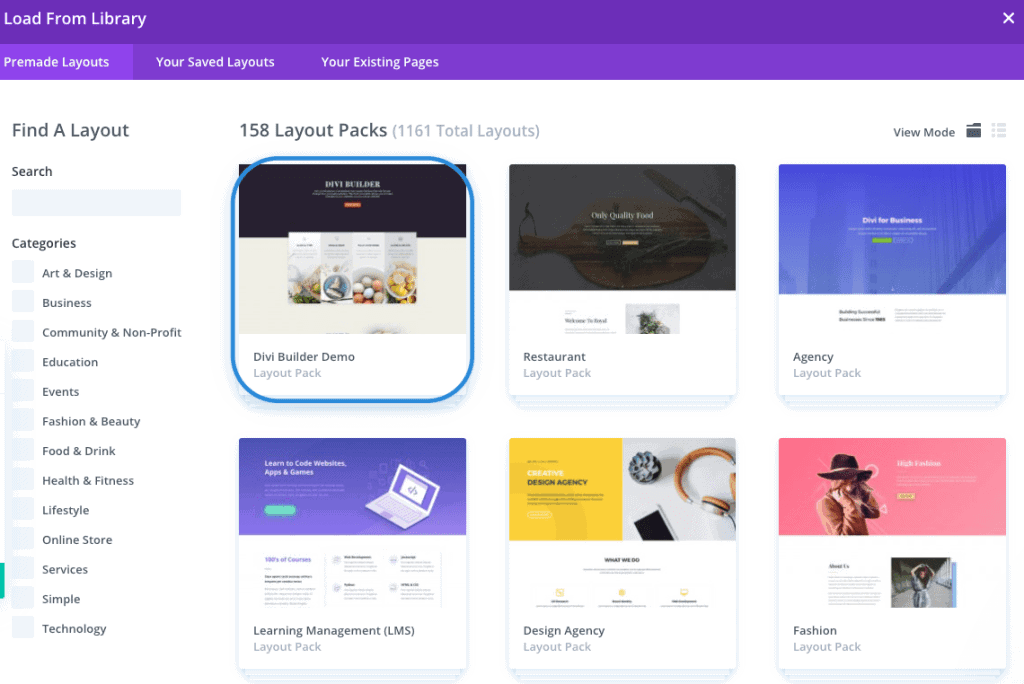
Did you know that Divi builder offers over 158 layout packs (from 1161 total layouts) across various categories?
From business to lifestyle to technology, no matter what industry you are in, you can use Divi premade layout packs to design a stunning website design effortlessly.
Just pick a layout of your choice and start customizing it using their easy to use drag and drop page editor. You’re good to go!
Customize however you want
Divi builder offers over 40 different content elements to choose from, such as Images, Videos, Text, and Buttons. Here’s how it looks like;

As you can see above, just click on any module and start customizing it. Inside the content tab, you can modify the module content elements, such as text and images.
It also offers a drag and drop feature, using which every item on the page can be dragged and dropped to new locations. You can also preview how your content looks on mobile devices. While editing your page, it’s easy to see what your design will look like on mobile devices.
Must Read: Elegant Themes Review [With Divi Builder]: Is It Worth Your Money?
Elementor Features
Elementor is not far behind when it comes to features as it includes a wide range of options which are included below.
- Offers you a simple drag and drop editor which lets you edit anything on your site easily
- Offers you visual Theme Builder which lets you customize anything on your site including your header, footer etc
- Offers you a Popup Builder which helps you create stunning popups within a few minutes
- Offers you over 80 website design elements (so you don’t have to rely upon too many plugins or 3rd party tools)
- Elementor plugin works with almost every single WordPress themes
- There are a ton of add-ons available (both on Elementor site and other platforms exclusively offer those add-ons)
- Also gives you access to a free theme called Hello theme (which is both responsive and search friendly)
- You can seamlessly integrate with your favourite marketing (ranging from social media platforms to email marketing tools)
- Gives you access to over 300 beautifully crafted templates
Does it offer any free demos?
No, but you can grab Elementor free plugin which offers you limited features.
Here are some of the useful features of using the Elementor page builder.
Access to over 80 design elements
From basic elements to theme elements, you’ll get access to over 80 stunning design elements with the Elementor Pro plugin.
Basic elements include;
- Star ratings
- Video embeds
- Sound cloud
- Google maps etc
Theme elements include;
- Post Title
- Post Excerpt
- Post Content
- Featured Image
- Author Box
- Post Comments etc
WooCommerce element include;
- Product Breadcrumbs
- Product Title
- Product Images
- Product Price
- Add To Cart
- Product Rating etc
That means you can easily customize your WordPress site by using anything ranging from star ratings on your product reviews to adding product price to your ECommerce site.
It offers a free plugin
Unlike the Divi Builder from Elegant themes, Elementor offers you a free version with limited features. If you want to try it for the first time or looking to build a simple site, the free version is more than enough.
The free plugin offers you some cool features including;
- 30 free widgets
- Visual and intuitive form builder
- Custom fonts
- Custom CSS
- Animated headlines
- Image and video sliders etc
Must Read: Elementor Review 2023: Is It The Best Page Builder Plugin for WordPress?
Elementor vs Divi: Pros And Cons
This Elementor and Divi builder comparison will be incomplete if we don’t talk about their pros and cons. So let’s discuss them now.
Elementor page builder Pros:
- It offers you a free version (which is mostly enough for a lot of bloggers to build and customize their WordPress sites)
- The ability to customise archive page and single post pages (which is definitely a great advantage over Divi builder if you want to custom design your blog pages)
- Elementor works perfectly with almost any WordPress theme
- Elementor Pro is really affordable (as its pricing starts at just $49 per year and it’s cheaper than the Divi builder)
Elementor page builder Cons:
- There’s no lifetime access option in Elementor pricing plans (unlike Divi where you can grab the Elegant themes membership for lifetime)
Divi page builder Pros:
- Unlimited access (you can buy any of their package once and then use their themes and plugins on unlimited websites)
- There’s a lifetime access option which costs just $249 (that means, if you pay $249, you will get access to the Elegant themes along with the Divi builder and other plugins for lifetime!!)
- They give you access to 24/7 chat option (so you can get your queries answered any time of the day)
- It offers an amazing support access (including a huge Facebook group, extensive documentation, a ton of tutorials and so on)
Divi page builder Cons:
- You will be using a ton of shortcodes when you’re using Divi (which means, the whole customization, edits on your blog posts and pages can get messy if you disable Divi or move to some other theme or page builder)
Read: GeneratePress vs Divi: Which is Best in 2023
What Others Are Saying About Divi & Elementor?
User reviews are extremely important for any product including visual page builders like Elementor or Divi. So what other users are saying about the two WordPress page builders?
Let’s find out the user reviews of both Divi and Elementor page builders.
What People Are Saying About the Elementor?
Elementor has raving reviews from users all over the blogosphere including on product software comparison sites like TrustPilot to WordPress forums.
On TrustPilot, Elementor got a TrustScore of 4.3 out of 5 ratings.

It also has a ton of 5 star rating reviews on WordPress plugin directory. With over 4 million installations, this plugin has a 4.9 star rating with over 5000 reviews at WordPress.org.

So what are you waiting for? If you feel Elementor Pro is for you, use the following link to try it today.
What People Are Saying About Divi Builder?
Divi Builder from the Elegant themes is not too far behind in terms of user ratings.
On TrustPilot, Elegant Themes got a TrustScore of 4.9 out of 5 ratings.

Quick note: Divi builder is a part of the Elegant themes and there’s no TrustScore separately maintained for Divi builder on Trustpilot.
Also, a ton of customers who are already using their themes and builder are enjoying their features. Have a look at the testimonials from real users.

Want to try the Divi builder? Use the following link to get started.
Read: Astra WordPress Theme Review 2023: Is It The Best Theme?
Read: GeneratePress vs Astra: Who’s the REAL Winner?
Read: Elementor Pro Discount Code 2023
FAQs About Divi vs Elementor
Here are some frequently asked questions around both these popular WordPress page builders i.e Divi and Elementor.
Can I use Elementor with Divi?
Yes, Elementor is a page builder plugin which needs a WordPress theme to start customizing a website. Divi offers a WordPress theme (apart from drag and drop editor). So yes, you can use Elementor with Divi theme.
But if you’re planning to use both Elementor and Divi page builders at the same time, it can lead to messy customization. So use any one of them (page builders).
What is the difference between Divi and Divi builder?
Divi is a WordPress theme whereas Divi builder is a drag and drop page builder which is developed by Elegant Themes. They both work flawlessly with each other or you can use any of them (according to your needs).
Do I still need a page builder plugin if I’m already using the Gutenberg editor from WordPress?
Yes. Although Gutenberg editor from WordPress is a nice edition but it is NOT a true page builder (it can NOT be considered as a fully featured page builder). If you have access to fully futuristic drag and drop page builders like Elementor or Divi, you will have unlimited options to customize your site.
Can I use Elementor with any theme
Yes, Elementor is a standalone page builder for WordPress that works on any WordPress theme (including free and premium themes). Elementor is a plugin that you need to install and activate to be able to use. You need a WordPress theme to be able to work with the Elementor plugin to design and customize your pages, posts etc.
Which is better divi or elementor?
Elementor and Divi both offer excellent page building features. Elementor offers both free and premium versions (starting at $59 per year). Divi from Elegant Themes membership costs $89 per year and you can use it on any number of sites. Divi Builder is beginner friendly whereas the Elementor builder is faster to work with.
Who Should Go for Elementor?
Elementor Pro is a great deal for;
– Website owners (who want to create stunning pages on their site)
– Beginners (who are looking for an easy to use page builder to customize their site however they want)
– Designers (who want to create unique landing pages, sales pages etc for their clients)
Who Should Go for a Divi Builder?
Divi Builder (including Elegant Themes membership) is a perfect choice for;
– Freelance web designers (you can opt for their lifetime deal and build any number of sites for your clients for lifetime!)
– Bloggers (who run multiple websites)
– Beginners (who are searching for a platform to grab both themes and a page builder like Divi)
Read: Elementor Review 2023: Is It The Best Page Builder for WordPress?
Read: 3 Proven Ways to Add Google Analytics to GeneratePress Theme
Final Thoughts
If you are looking for an easy way to design your website, drag and drop page builders are extremely helpful for you. Even if you’re a beginner with zero technical skills, you can use page builders like Divi builder or Elementor Pro to customize your site.
Both of these drag and drop editors are extremely easy to use, offer a wide range of features and both are affordable.
So which one are you going to pick to customize your WordPress sites? Do you have any more questions around WordPress Divi builder vs Elementor? Let us know your thoughts in the comments.







